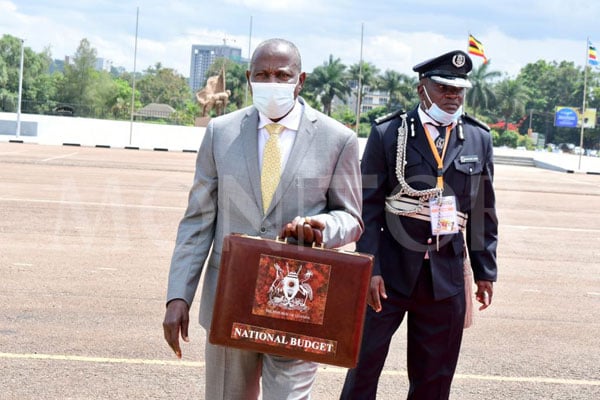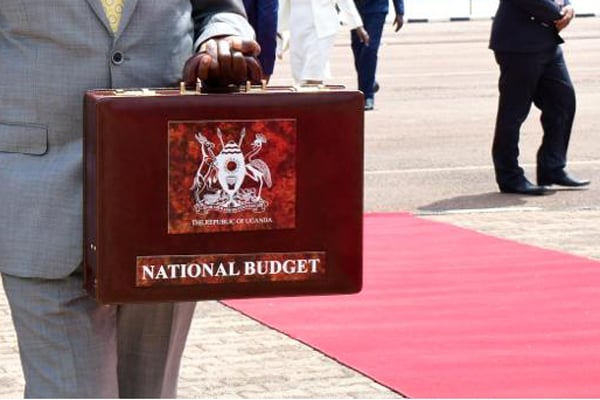Prime
Uganda’s economy expanded to Shs162 trillion – Kasaija

An elderly man attends a village meeting on malnutrition in Rupa, Karamoja region, Uganda, on May 23, 2022. Uganda's minister of Finance, Mr Matia Kasaija while reading the 2022/2023 national budget on June 14, 2022 said the size of the country’s economy expanded to Shs162.1 trillion (about $45.7 billion) in the financial year ending June 30. PHOTO/ AFP
What you need to know:
- Government said the size of the economy grew from Shs108.5 trillion in 2016/17 to Shs148.3 trillion by June 2021, which was equivalent to $40 billion.
The Ministry of Finance Planning and Economic Development Tuesday said the size of Uganda’s economy expanded to Shs162.1 trillion (about $45.7 billion) in the financial year ending June 30, 2022.
According to him, the size of the economy grew from Shs108.5 trillion in 2016/17 to Shs148.3 trillion by June 2021, which was equivalent to $40 billion.
While presenting the national budget for the financial year 2022/2023, at Kololo Independence Grounds, Finance minister Matia Kasaija said economic activities have been more buoyant at the growth rate of 4.6 percent per annum this financial year up from 3.5 percent last year.

Finance Minister Matia Kasaija arrives at Kololo ceremonial grounds in Kampala for national budget reading on June 14, 2022. PHOTO/ DAVID LUBOWA
“This shows that the economy is on a path to full recovery from the COVID-19 disruptions. With this buoyant recovery and resilience of the economy—induced by our deliberate and prudent economic policies, the services sector is expected to grow by 3.8 percent up from 2.8 percent last financial year,” he said.
This is on account of continued recovery in wholesale and retail trade, education and tourism services; coupled with growth in real estate activities and ICT.
The services sector is projected to contribute 41.5 percent to GDP, according to government while the industry sector is expected to grow by 5.4 percent up from 3.5 percent growth last financial year, largely on account of recovery in manufacturing and construction activities. The industry sector is projected to contribute 26.8 percent to our GDP.
The agriculture sector is expected to grow by 4.3 percent, largely as a result of growth in food and cash crop production, livestock as well as recovery in fishing. This is the same rate at which the agriculture sector grew last year. The sector contributed 24.1 percent to total economic output.
On the overall, fiscal policy, Mr Kasaija said the revenue collection target in financial year 2021/22 Budget was Shs22.425 trillion. Total revenue collection is now projected at Shs21.486 trillion. This represents a shortfall of Shs 939 billion.

Vendors sell vegetables at a market in Soroti, Karamoja region, Uganda, on May 27, 2022. PHOTO/ AFP
Despite this revenue shortfall, domestic revenue collection this financial year has improved compared to last year. This has been on account of improved tax administration and increased economic activity following the full re-opening of the economy in January 2022.
External Sector Performance, the minister said total export receipts of goods and services amounted to $5.74 billion in the 12 months to April 2022, down from $6.2 billion in the 12 months before. However, merchandise exports reduced by $858 million in the same period while coffee receipts increased by $279.5 million to $811 million in the same period.
Regarding the private sector economic activities, Mr Kasaija said the sector imports of goods increased significantly to $6.4 billion in the year to April 2022 from $5.0 billion in the previous 12 months. This increase is attributed largely to investments in the oil and gas sector. For the same reason, foreign direct investment has rebounded strongly to $1.36 billion in the year to April 2022 from $892 million in the same period a year before.
Uganda’s international reserves at the end of April 2022 increased to $4.54 billion, equivalent to about 4.6 months of imports. This was an increase from $3.57 billion as at April 2021.
Mr Kasaija said the budget for the next financial year presents a set of strategic choices and the government’s commitment to stimulate economic recovery, enhance productivity and competitiveness of enterprises, and most importantly wealth creation and jobs for the ordinary Ugandans.
“Substantial resources have been earmarked for the implementation of the Parish Development Model. This model will be the vehicle of socioeconomic transformation at the parish level, and the monetization of the Ugandan economy,” he said.
Mr Kasaija added: “Successful implementation of the Parish Development Model ushers in a mass socio-economic transformation movement in our society with better sustained outcomes. I therefore urge all leaders and Ugandans to ensure that these resources are effectively used to bring about the desired change.”




